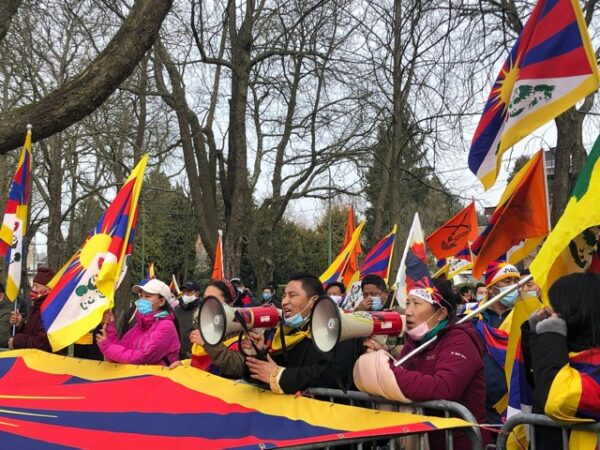
A protest in Brussels on Tibetan Uprising Day 2021
As Tibetans protested yesterday on the anniversary of their historic uprising against Chinese rule, government leaders around the world voiced support for the Tibetan people and their 62 years of struggle against China’s oppression.
Tibetan Uprising Day on March 10, 2021 featured commemorative events in all areas where Tibetans reside, as well as statements of solidarity from other persecuted groups and messages from elected officials across the globe.
“Sixty-two years ago, brave Tibetans rose up against the Chinese invasion to protect their way of life and culture,” US House Speaker Nancy Pelosi, D-Calif., said in a written message recalling March 10, 1959, when thousands of Tibetans took to the streets of their capital city, Lhasa.
Although the Chinese government eventually crushed their movement—killing thousands in the process—the Tibetans succeeded in keeping the struggle alive, including protecting their leader, the Dalai Lama, and helping him escape to safety in neighboring India.
62 yrs ago, Tibetans rose up against the Chinese invasion to protect their way of life. As we continue to be inspired by the @DalaiLama’s powerful message of peace, faith & love, we honor those who sacrificed for their rights & freedom.https://t.co/SX76wa38G4
— Nancy Pelosi (@SpeakerPelosi) March 11, 2021
Today, Tibet remains under China’s brutal occupation, with the US watchdog group Freedom House recently declaring that Tibet is now tied with Syria as the least-free country on Earth. But Tibetans both inside their homeland and in exile continue to resist nonviolently.
“Over a million Tibetans have lost their lives in the past six decades under Chinese rule,” said Lobsang Sangay, president of the Central Tibetan Administration, which provides democratic governance for the Tibetan exile community.
“Today, we have come together to collectively mourn this loss. But we are also here to mark the undaunted resilience of Tibetans in Tibet. Even under the threat of losing their lives, they continue to protest by protecting and preserving our language, our religion, our land, and our identity.”
In his statement, Speaker Pema Jungney of the Tibetan Parliament in Exile called for “the ongoing evil routine of carrying out torture, persecution and other forms of ill-treatment in the prisons in Tibet [to] be stopped.”
Protests across the globe
The International Campaign for Tibet, an advocacy group that promotes human rights and democratic freedoms for the Tibetan people, took part in protests on Tibetan Uprising Day in Europe and the United States.
In Berlin, Kai Mueller, executive director of ICT Germany, spoke at a demonstration outside the Chinese Embassy. Tibet Initiative Germany organized the event.
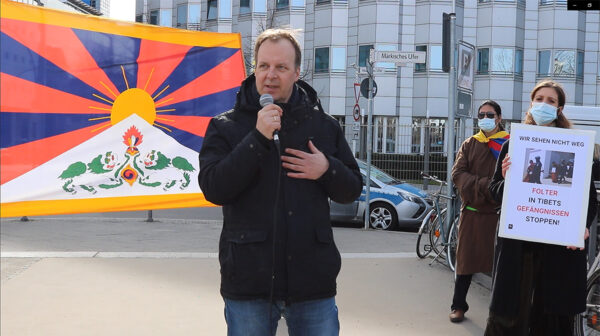
ICT Germany Executive Director Kai Mueller at the protest in Berlin
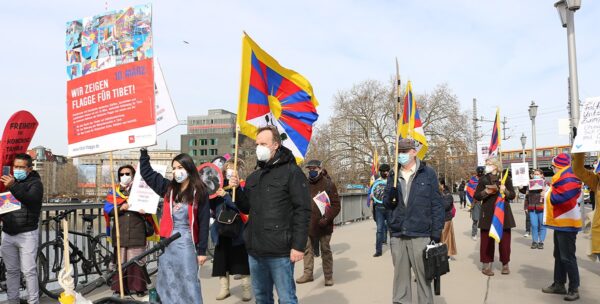
ICT Germany Executive Director Kai Mueller at the protest in Berlin
The Tibetan community of Brussels organized two protests with the support of ICT Brussels. One of the protests took place at Schuman Roundabout, and the other in front of the Embassy of the People’s Republic of China.
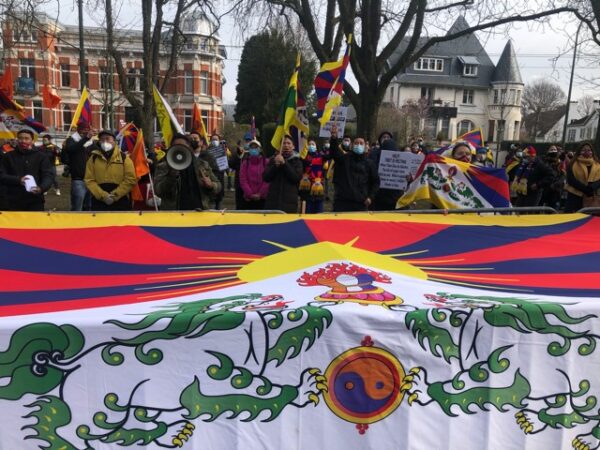
Tibetans protest outside the Chinese Embassy in Brussels
About 100 people participated in the events, with numbers limited due to coronavirus restrictions.
Representatives of the European and Belgian Parliaments delivered statements, as did Tashi Phuntsok, representative of His Holiness the Dalai Lama in Brussels.
Vincent Metten, EU policy director at ICT, called on the EU and its member states to use the new EU Global Human Rights Sanctions Regime against Chinese officials responsible for serious human rights abuses in Tibet.
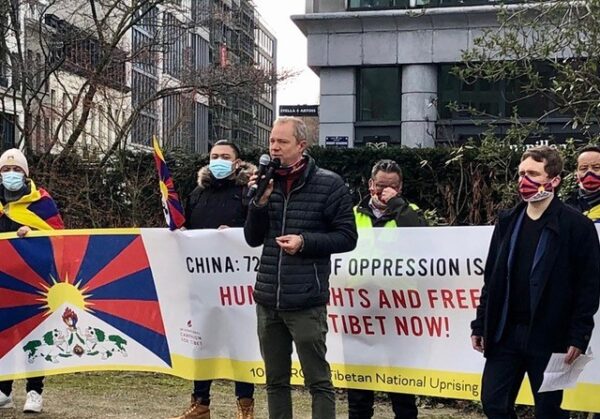
Vincent Metten, EU policy director at ICT, called for sanctions against Chinese officials at a rally in Brussels
ICT Europe also took part in a protest in the Netherlands.
#TibetanUprisingDay commemoration in #TheNetherlands https://t.co/q5xHp7uiaw
— International Campaign for Tibet (@SaveTibetOrg) March 10, 2021
Demonstration in Washington, DC
In Washington, DC, the Capital Area Tibetan Association and the Regional Tibetan Youth Congress staged a protest outside the Chinese Embassy.
The protest featured remarks from Robert A. Destro, who served as special coordinator for Tibetan issues in the Trump administration.
Several ICT US staff members took part in the event, including Tencho Gyatso, the organization’s interim vice president.
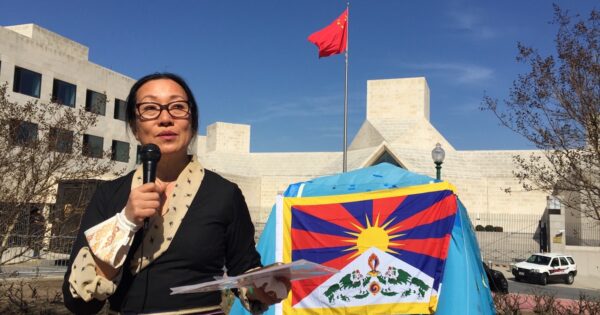
ICT Interim Vice President Tencho Gyatso joined other protestors at the demonstration in Washington, DC
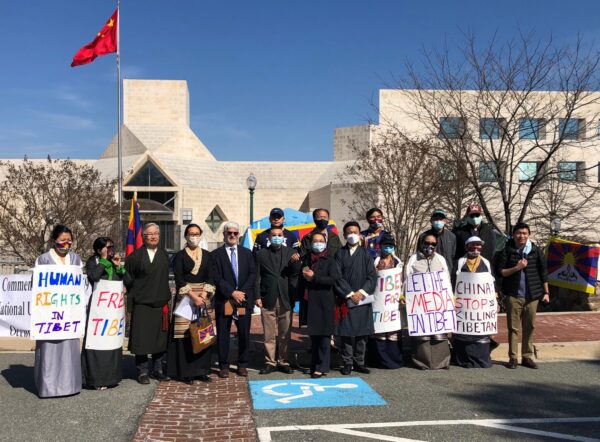
ICT Interim Vice President Tencho Gyatso joined other protestors at the demonstration in Washington, DC
ICT’s interim president, Bhuchung Tsering, also served as a panelist at a virtual event, “Tibetan National Uprising Day: 62 years of Struggle, Challenges and the Way Forward,” hosted by Tibetan organizations in Toronto.
Later in the day, The Jamestown Foundation hosted a webinar titled, “The Future of Tibet.” ICT Board Member Ellen Bork was one of the panelists.
After the protest in Washington, the protestors traveled in a car caravan with a planned route around the White House and the US Capitol.
Solidarity from other groups
The protest in Washington also featured remarks from Yang Jianli, a Chinese democracy activist who is president of Citizen Power Initiatives for China. Yang said during his speech, “I remain hopeful for a free Tibet!”
Chinese dissidents weren’t the only group oppressed by Beijing that spoke up on Tibetan Uprising Day.
The World Uyghur Congress released a statement noting that Tibetans and Uyghurs “share a similar history and struggle.”
Chen Quanguo, the Chinese Communist Party secretary in Xinjiang—which Uyghurs know as East Turkestan—previously served in the same position in the Tibet Autonomous Region, which spans about half of Tibet. After developing his system of mass surveillance and oppression in the TAR, Chen is now helping to lead China’s horrific genocide of Uyghurs.
“Today and every day, the World Uyghur Congress stands in solidarity with Tibetans, defending human rights and freedom,” the group said.
Earlier in the week, there was a Tibetan Uprising event in Taiwan that drew hundreds of people to the streets of Taipei. Politicians from several Taiwanese political parties reportedly took part in the event.
Hundreds rallied in Taiwan on Sunday to commemorate the 62nd anniversary of the 1959 Tibetan Uprising against China in Lhasa – including Tibetan activists and Taiwanese officials from multiple political parties.
Photos: RFA Mandarin/Paul Lee
Photos: RFA Mandarin/Paul Lee pic.twitter.com/1sLZJImd20
— Radio Free Asia (@RadioFreeAsia) March 10, 2021
Politicians’ statements
Politicians around the world shared their support for Tibet on Tibetan Uprising Day.
At the rally in Brussels, Mikulas Peksa, president of the Tibet Interest Group of the European Parliament, said, “Europe cannot stay idle while the tragedy in Tibet continues to unfold.”
In addition, Samuel Cogolati, vice chair of the committee of foreign affairs of the Belgian Parliament, expressed his strong support for defending the rights of Tibetans at the national and European levels.
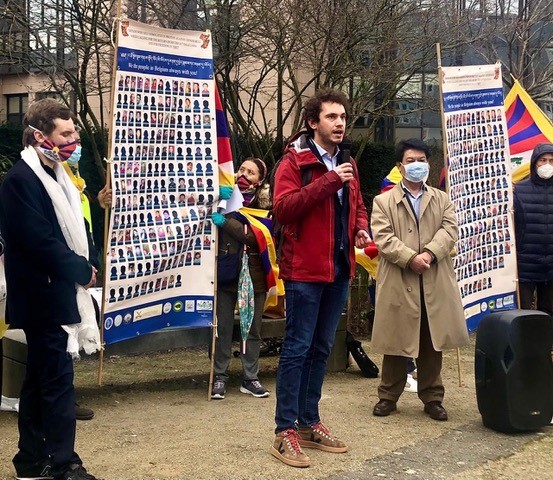
Belgian parliamentarian Samuel Cogolati expressed his strong support for Tibetans
In the US, along with Pelosi’s statement, several members of Congress spoke up for the Tibetan people, including Sen. Marco Rubio, R-Fla., and Rep. Ami Bera, D-Calif.
Today we remember the brave Tibetans who rose up in 1959 against the PRC and are today keeping hope alive for a #FreeTibet. #Beijing continues to break its promises to Tibetans, Chinese, Uyghurs, HKongers & the world. We must all wised up to the CCP’s duplicitous nature.
— Senator Rubio Press (@SenRubioPress) March 10, 2021
On the 62nd anniversary of the Tibetan Uprising, we remember the brave Tibetans who died resisting PRC occupation and reaffirm our support for the Tibetans’ quest for genuine autonomy and their right to live free from the PRC’s oppression. pic.twitter.com/xO01QQDUI6
— Ami Bera, M.D. (@RepBera) March 10, 2021
Rep. James McGovern, D-Mass., voiced his support in a video to the Regional Tibetan Association of Massachusetts, Amherst. And Rep. Alexandria Ocasio-Cortez, D-N.Y., spoke in solidarity with Tibetans in her district—and around the world—in a speech on the floor of Congress.
NY-14 is home to a vibrant community of Tibetans. On Tibetan Uprising Day, we renew our commitment to their fight for freedom.
Tibetans simply seek the freedom to be – to speak their language, practice their religion, sustain their culture & to live freely in their own country. pic.twitter.com/AEqtnoMtou
— Rep. Alexandria Ocasio-Cortez (@RepAOC) March 10, 2021
Government support
McGovern and Rubio helped introduce the Tibetan Policy and Support Act, a groundbreaking new law that is dramatically upgrading US support for the Tibetan people.
Among many other things, the TPSA makes it official US policy that only the Dalai Lama and the Tibetan people can decide what happens with his succession once the 85-year-old spiritual leader eventually dies. If any Chinese officials try to interfere in that process—as the Chinese government has long said they will do—the US government will sanction them.
Although the TPSA became law under the last administration, a spokesperson for the US State Department told reporters just before Tibetan Uprising Day that the Biden administration “believe[s] that the Chinese government should have no role in the succession process of the Dalai Lama.”
‘China should have no role in Dalai Lama succession process’: Biden official pic.twitter.com/iWPLR1bitt
— Tibet.net (@NetTibet) March 10, 2021
The TPSA is just one example of several recent government actions that help the Tibetan people:
- The US also passed the Reciprocal Access to Tibet Act in 2018, taking aim at China’s unfair policy of keeping Americans journalists, diplomats and ordinary citizens out of Tibet. As part of RATA, the State Department announced last summer that it had banned Chinese officials from entering the US over their role in keeping Americans out of Tibet.
- President Biden issued a statement during his campaign saying that the “Biden-Harris administration will stand up for the people of Tibet.” Biden promised to push the Chinese government to give Americans access to Tibet and to return to direct negotiations with the representatives of the Tibetan people.
- Officials in other governments have also recently spoken up for Tibet, including Belgium, Germany, the Netherlands and the European Union.
These actions show that even though 62 years have passed since the Tibetan Uprising, international support for Tibet will not fade anytime soon.
Tibet Talk
The honoring of the Tibetan Uprising continued today, March 11, 2021, with the newest episode of ICT’s Tibet Talks.
The episode featured a panel discussion about the Tibetan Uprising with Tsering, ICT’s interim president; Tseten Wangchuk, a Tibetan journalist and Sino-Tibetan commentator in Washington, DC; Li Jianglin, an independent scholar and writer who specializes in post-1950 Tibetan history; and Tsewang Rigzin, a fellow at the Columbia Population Research Center and a social policy and policy analysis doctoral candidate at Columbia University.

